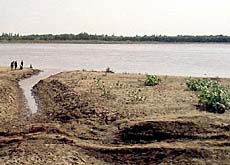Swisspeace strives to prevent water wars

Countries without enough water are increasingly having to strike deals with neighbours, creating the potential for conflict.
The Swiss Peace Foundation, Swisspeace, is working in Africa and central Asia to try to prevent water disputes from boiling over into war.
“The problem is that everyone needs water and the main issue will be how to share it,” said Eva Ludi, projector coordinator for Swisspeace’s environmental conflicts department.
It is a long time since countries went to war over water. The last full-scale conflict directly linked to water was 4,500 years ago over the Tigris-Euphrates river in present-day Iraq.
Yet growing pressure on the ever-dwindling resource is prompting fears that future wars will be fought over water. In fact, experts say water will replace oil as a major source of conflict in future.
Nile Basin
One potential flashpoint is the Nile Basin. Egypt is almost totally dependent on water the River Nile carries from Ethiopia and would like to use any excess rainfall to irrigate its agricultural lands further downstream.
“The problem from Ethiopia’s point of view is that rainfall is irregular and that in drought years they experience famine. They would like to develop their water resources,” Simon Mason, a Swisspeace researcher, told swissinfo.
“Now if Ethiopia develops its water resources in a manner that does not take Egypt’s downstream interests into consideration, and uses a lot of water, that could potentially lead to an escalation of the conflict.”
Workshops
Mason arranged for water experts from both countries as well as Sudan to meet in a series of workshops where delegates were presented with Swisspeace’s assessment of the issues at stake.
Communication is central to the Swisspeace formula for identifying and dealing with water disputes. Delegates could interact to get to know each other’s perceptions better and work on clarifying of the issues at stake.
“The aim was to create a joint publication… on where there is consensus and where there are points that still need to be worked on,” he said.
“Up until now, there have been several assessments of water issues in the Nile Basin but they have often been from one side only.”
Mediation
The Nile Basin marks a new, higher level of intervention in water conflicts for Swisspeace, which has been working on environmental conflicts together with the Centre for Security Studies at the Federal Institute of Technology in Zurich since 1992.
The Bern-based non-governmental organisation hopes to replicate this form of direct involvement in other water disputes it is involved in around the world.
“I think we can try to take up the role of mediator,” said Ludi.
The United Nations’ education, scientific and cultural organisation, Unesco, has published a list identifying 17 river basins which could be future sources of conflict.
These include the Okavango and Limpopo rivers in southern Africa, and the Salween which runs through China, Myanmar and Thailand.
Also on the list is the Aral Sea in central Asia where Swisspeace is also engaged, looking at how governments and NGOs are intervening to mitigate the conflict.
Aral Sea
The problems of the Aral Sea exploded when the Soviet Union disintegrated, leaving Uzbekistan, Kyrgyzstan, Tajikistan, Turkmenistan and Kazakhstan to tackle environmental problems and share the water.
Agricultural practices, industrial waste and water diversions have resulted in the drying up, salinisation and pollution of the Aral Sea.
Armed conflict has been averted by international agreements and Swisspeace is convinced similar accords provide a model for future conflict resolution.
Ludi says disputes are more likely to break into violent conflict at an internal rather than international level.
“I think at the moment at least, the tendency is still towards cooperation at the international level. But this does not mean that at the sub-national level, conflicts over water will not erupt in violent conflict,” she said.
The United Nations has turned the spotlight onto water, designating 2003 as the International Year of Freshwater. Throughout this year, swissinfo will provide special coverage on the threats this natural resource is facing, as well as the importance it plays in all aspects of life.
swissinfo, Samantha Tonkin
Swisspeace is a non-governmental organisation sponsored by the Swiss Agency for Development and Cooperation (SDC).
It is carrying out its work within the NCCR North-South – Research Partnerships for Mitigating Syndromes of Global Change Programme.
Swisspeace is conducting research into a dispute between Egypt, Sudan and Ethiopia over the Nile River.
It is also involved in researching a deepening conflict between Uzbekistan, Kyrgyzstan, Tajikistan, Turkmenistan and Kazakhstan over water resources in the Aral Sea.

In compliance with the JTI standards
More: SWI swissinfo.ch certified by the Journalism Trust Initiative








You can find an overview of ongoing debates with our journalists here . Please join us!
If you want to start a conversation about a topic raised in this article or want to report factual errors, email us at english@swissinfo.ch.